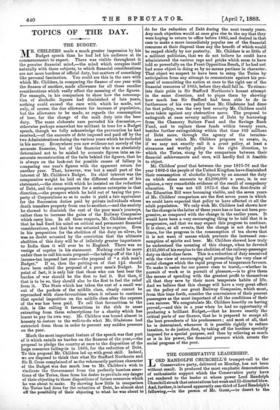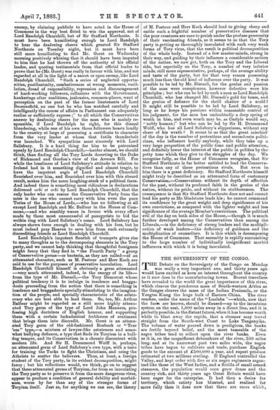THE CONSERVATIVE LEADERSHIP. ORD RANDOLPH CHURCHILL'S trumpet-call to the J
Conservative party, delivered on Monday, has not been. without result. It produced the most emphatic demonstration of enthusiastic support which the Conservative party have yet rendered to the leader at whose power Lord Randolph Churchill struck that ostentatious but weak and ill-directed blow. And, further, it induced apparently one-third of Lord Randolph's following,—in the person of Mr. Gorst,—to desert to the
enemy, by claiming publicly to have acted in the House of Commons in the way best fitted to win the approval, not of Lord Randolph Churchill, but of Sir Stafford Northcote. It
must have been humiliating enough to Lord Randolph to hear the deafening cheers which greeted Sir Stafford
Northcote on Tuesday night, but it must have been still more humiliating to find Mr. Gorst on Wednesday morning positively whining that it should have been imputed to him that he had thrown off the authority of his official leader, and quoting testimonials from that official leader to prove that he (Mr. Gorst) was really in favour with him, and not regarded at all in the light of a secret or open enemy, like Lord Randolph Churchill. " Such a series of neglected opportu- nities, pusillanimity, combativeness at wrong moments, vacil- lation, dread of responsibility, repression and discouragement of hard-working followers, collusions with the Government, hankerings after coalitions, jealousies, common-places, want of perception on the part of the former lieutenants of Lord Beaconsfield, no one but he who has watched carefully and intelligently the course of affairs in Parliament can adequately realise or sufficiently express ;" to all which the Conservatives answer by deafening cheers for the man who is mainly re-
sponsible, if Lord Randolph be right, for this dismal blundering, while one of his own three followers boasts loudly to the country at large of possessing a certificate to character from the very leader at whom that futile thunderbolt was launched. We sympathise most sincerely with Lord Salisbury. It is a hard thing for him to be patronised openly by Lord Randolph Churchill,—harder almost, we should think, than finding all the Tory Lords deserting to the Duke of Richmond and Gordon's view of the Arrears Bill. For while the loneliness of Lord Salisbury's attitude in relation to Ireland had in it something dignified and almost tragic, to have the impotent aegis of Lord Randolph Churchill flourished over him, and flourished over him with this absurd result, makes him the mere laughing-stock of a political farce. And indeed there is something most ridiculous in declarations delivered urbi et orbi by Lord Randolph Churchill, that the only leader who can rescue the Conservative Party from the mire is the one who cannot carry with him even the pure Tories of the House of Lords,—who has no following at all except Lord Randolph and Mr. Balfour in the House of Com- mons,—and who sensibly wanes in favour with every effort made by these most unsuccessful of panegyrists to bid the welkin ring with Lord Salisbury's name. Lord Salisbury has always shown force enough in dealing with his foes, but he must indeed pray Heaven to save him from such extremely discrediting friends as Lord Randolph Churchill.
Lord Randolph's impotent flourish of trumpets gives rise to many thoughts as to the decomposing elements in the Tory party, and we cannot help thinking that thoughtful foreigners might fancy that they find in " the Fourth Party " a group of Conservative germs—or bacteria, as they are called—of an attenuated character, such as M. Pasteur and Herr Koch are said to use for the purposes of preservative inoculation. Lord Randolph Churchill himself is obviously a germ attenuated —very much attenuated, indeed, in the energy of its life— from the type of Mr. Disraeli,—the Tory Democrat whose political tendency it is to indulge in insolence and bragga- docio proceeding from the notion that there is something in insolence and braggadocio specially stimulating to the imagina- tion of the people, and specially characteristic of the aristo- cracy who are best able to lead them. So, too, Mr. Arthur Balfour might be regarded as a still more highly attenu- ated Tory germ of the type of Lord John Manners, pro- fessing high doctrines of English honour, and supporting them with a certain lackadaisical feebleness of sentiment that brings them into discredit. Mr. Gorst is an attenu- ated Tory germ of the old-fashioned Roebuck or " Tear 'em" type,—a mixture of lawyer-like astuteness and some- what bullying defiance, a type that finds its Toryism in a bull- dog temper, and its Conservatism in a chronic discontent with modern life. And Sir H. Drummond Wolff is, perhaps, an attenuated germ of Lord Salisbury's own type, with a taste for training the Turks to fight the Christians, and using the Atheists to scatter the believers. Thus, at least, a foreign student of the Tory party, in its evident decomposition, might fancy ; but his reflections would, we think, go on to suggest that these attenuated germs of Toryism, far from so inoculating the Tory party as to preserve it from the more dangerous virus, appear to produce a condition of general debility and morbid- ness, worse by far than any of the stronger forms of Toryism itself. Just as, for anything we can see, the theory of M. Pasteur and Herr Koch should lead to giving sheep and cattle such a frightful number of preservative diseases that the poor creatures are sure to perish under the profuse generosity of their vaccinating friends, so it seems to us that the Tory party is getting so thoroughly inoculated with such very weak forms of Tory virus, that the result is political decomposition of the whole body. Instead of a few master-minds, strong in their way, and guiding by their influence a considerable section of the nation, we now get, both on the Tory and the Liberal side, but especially on the Tory, a number of very inferior minds, still more representative, perhaps, of the average ability and taste of the party, but for that very reason possessing much less than the old kind of influence over the party. It was possible to be led by Mr. Disraeli, for the genius and passion of the man were conspicuous, however defective were his principles ; but who can be led by such a man as Lord Randolph Churchill, who has changed Mr. Disraeli's gold for brass, and the genius of defiance for the shrill chatter of a scold ? It might still be possible to be led by Lord Salisbury, so long as he keeps his passions within reasonable control of his judgment, for the man has undoubtedly a deep spring of wrath in him, and even wrath may be, as Carlyle would say, "nobly human ;" but who can be led by Sir H. Drummond Wolff, who has all Lord Salisbury's slipperiness, without any share of his wrath ? It seems to us that the great mischief of the day is the number of pretentious and second-rate politi- cians, who influence hardly anybody, while they take up a very large proportion of the public time and public attention,. and definitely lower the interest of the public in politics by the- petty tone which they give to the struggles of the day. We recognise fully, as the House of Commons recognise, that Sir Stafford Northcote is far better entitled to lead the Conserva- tives than any of these pretentious rivals. But even in, him there is a great deficiency. Sir Stafford Northcote himself might truly be described as an attenuated form of customary Conservatism,—Conservatism without its depth of affection for the past, without its profound faith in the genius of the nation, without its pride, and without its stubbornness. The consequence is that Sir Stafford Northcote does not and cannot lead his party as Mr. Gladstone leads his ; he cannot command its confidence by the great weight and deep significance of his own convictions, as compared with the lighter weight and less significance of the average Member's convictions. The political evil of the day on both sides of the House,—though it is much further developed among the Conservatives than among the Liberals,—is the deficiency of strong leaders and the multipli- cation of weak leaders—the deficiency of guidance and the multiplication of counsellors. It is this which is decomposing the House of Commons. That assembly is rapidly succumbing to the large number of individually insignificant morbid influences with which it is being inoculated.



































 Previous page
Previous page